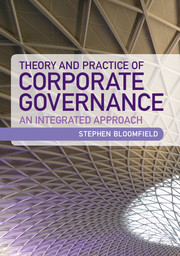Book contents
- Frontmatter
- Contents
- List of Figures and Tables
- Introduction
- Part 1 The Discipline of Governance
- Part 2 The Relationship between Law and Governance
- Part 3 Governance and the Listed Company
- Part 4 Governance and Regulation
- Chapter 9 The company and the stock market
- Chapter 10 Non-shareholder regulation of companies
- Chapter 11 Changes in regulatory structures – the PRA, the FCA and the ICB recommendations
- Chapter 12 Failure – the abiding characteristic of regulation
- Chapter 13 Accounting for profits: the root of information asymmetry
- Chapter 14 Reward and performance
- Part 5 Counter-governance: Failures of governance and corporate failure
- Bibliography
- Index
- References
Chapter 11 - Changes in regulatory structures – the PRA, the FCA and the ICB recommendations
from Part 4 - Governance and Regulation
Published online by Cambridge University Press: 05 March 2013
- Frontmatter
- Contents
- List of Figures and Tables
- Introduction
- Part 1 The Discipline of Governance
- Part 2 The Relationship between Law and Governance
- Part 3 Governance and the Listed Company
- Part 4 Governance and Regulation
- Chapter 9 The company and the stock market
- Chapter 10 Non-shareholder regulation of companies
- Chapter 11 Changes in regulatory structures – the PRA, the FCA and the ICB recommendations
- Chapter 12 Failure – the abiding characteristic of regulation
- Chapter 13 Accounting for profits: the root of information asymmetry
- Chapter 14 Reward and performance
- Part 5 Counter-governance: Failures of governance and corporate failure
- Bibliography
- Index
- References
Summary
This chapter will review the following issues:
changes in regulatory organisation brought about by the splitting of the FSA into two components;
the argument for treating the regulatory control of the financial sector as a special case embedded in the changes;
the continuation of the development of the role of the FSA as a shareholder proxy;
the changes brought about by the ICB recommendations;
shortcomings of the proposed changes;
transparency charges.
Regulatory activity over companies may include aspects of both procedural and behavioural activity as well as systemic regulation. Thus it concerns itself with the detail of individual transactions; with the culture against which those transactions are effected (structural governance) and the inter-relationships between those two at the level of the whole system. In the UK the landscape of regulatory activity for the financial services sector will be changed substantially in early 2013 when the FSA splits into two parts to become the Prudential Regulation Authority (PCA) and the Financial Conduct Authority (FCA). While this change is essentially a matter of sectoral regulation its impact goes much further. The change emphasises the significance of the financial sector to the UK economy – not only in terms of companies that are involved in operations in finance but also through their activities as investors and financiers of other companies.
- Type
- Chapter
- Information
- Theory and Practice of Corporate GovernanceAn Integrated Approach, pp. 263 - 276Publisher: Cambridge University PressPrint publication year: 2013



